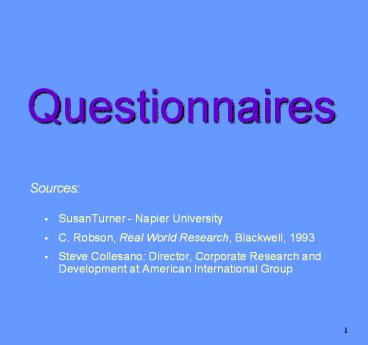Sources: PowerPoint PPT Presentation
1 / 20
Title: Sources:
1
Questionnaires
- Sources
- SusanTurner - Napier University
- C. Robson, Real World Research, Blackwell, 1993
- Steve Collesano Director, Corporate Research and
Development at American International Group
2
Appearance and instructions are vital
- The questionnaire should look easy to fill in,
with plenty of space for answers and questions. - Keep the design simple and give clear
instructions, repeating them if confusion seems
possible. - Ticking boxes is less confusing than circling
answers
3
Organisation
- Keep similar questions together, or you risk
annoying respondents. - For long questionnaires use section titles to
break up questions. - Be sure break out questions are properly labeled
so that each respondent knows where he/she
should go. - It is common to use formatting or colour for all
instructions so that they stand out
4
Order questions carefully
- Initial questions should be easy and interesting.
- Middle questions cover the more difficult areas.
- Flow questions from the general to the specific
use simple language. - Make the last questions interesting to encourage
completion and return of the questionnaire.
5
Clarity
- Provide clear instructions for every question
- Tell respondents what they should do.
- Avoid multiple dimension questions ask one
thing. - For instance
- "The following is a list of reasons you might
have considered when choosing to pursue your MSW.
For each, please indicate how important it was"
or "Please check the single most important
reason.
6
Specific questions are better than general ones
- More general questions tend to produce (a) a
wider variety of interpretation by respondents
(b) are more likely to be influenced by other
questions (c) are poorer predictors of actual
behaviour - General List the software packages you have used
- Specific Which of these software packages have
you used? Visual Basic Word Excel Powerpoint
7
Closed questions are usually preferable to open
questions
- Closed questions help to avoid differences in
interpretation. Open questions are more difficult
to analyse. - However, sometimes there are good reasons for
using open questions, for instance when seeking
comments in the respondents own words, when not
enough is known to construct response categories,
and in the measurement of potentially sensitive
views or behaviour.
8
Examples
- Open People look for different things in a job
what sort of things are important to you in your
job? - Closed People look for different things in a
job which one of the following five things is
most important to you in your job?good pay / a
feeling of achievement / ability to make your own
decisions /...
9
Consider a no-opinion option
- If there is no such option substantial numbers of
people may manufacture an opinion for the
questionnaire.ExampleNo-opinion response
option - The Web offers a wonderful opportunity to keep
up-to-date with technical developments. Do you
agree, disagree or not have an opinion on
that?Agree / Disagree / No opinion
10
Think about omitting the middle choice
- On the one hand a middle choice may encourage a
non-committal response - On the other it allows for additional shades of
opinion. - One strategy is to omit the explicit middle
choice and follow-up with an intensity item
which separates out strong feelings from mild
leanings.
11
Examples
- No middle category
- Should degree courses be easier or more difficult
than they are now? Easier 1 2 3 4 More
difficult - Middle category
- Should degree courses be easier, more difficult,
or stay the same as they are now?Easier
More difficult The same
12
Vary the orientation of rating scales or
intersperse with other questions
- If a questionnaire contains a lot of similar
rating scales, all of which have, say, the good
end at the left and the bad end at the right,
people sometimes develop a response set and go
down the page ticking each scale in the same
place. Either reverse the ends of some of the
scales or put some other types of question in
between. This is only worth considering if there
are more than a few rating scales.
13
Consider using forced choice rather than
agree/disagree statements
- Some respondents tend to agree with statements
regardless of their content. - Generally forced choice questions encourage a
more considered response.
14
Examples
- Forced-choice
- Would you say that most text-based interfaces are
easier to use than GUIs or that most GUIs are
easier to use than text-based interfaces?GUIs
easier Text based interfaces easier - Agree/disagree
- Do you agree or disagree with this statement?
Most text-based interfaces are easier to use than
GUIs.Agree Disagree
15
Add a concluding note
- This can ask respondents to check they have
answered all questions - Encourage an early return of the questionnaire
with the deadline date (and return details, if
not using a pre-addressed envelope) - Offer to send a summary of the findings (if
appropriate) - THANK THEM FOR THEIR HELP.
16
Include a covering note
- This should introduce the survey, explaining its
purpose and importance, assure confidentiality
and encourage reply. - Explain any serial numbers or other codings if
they are used.
17
Make return easy
- Using an organisations internal mail is often
easiest (include a pre-addressed envelope). - Or arrange for a box to be place in a convenient
place to be collected by you.
18
Consider using email
- For people who habitually use email, an email
questionnaire can be one of the easiest ways to
get a good response rate. - The Web is also worth considering. For example
look at - http//www.surveymonkey.com/
19
PRE-TEST THE QUESTIONNAIRE
Pretest all individual questions by having a
typical respondent react to each if someone is
confused by a question, it is a bad question
you will not have the luxury of explaining it in
the actual questionnaire.
20
Finally
Before you use the questionnaire, you must have
your supervisors agreement in writing.

